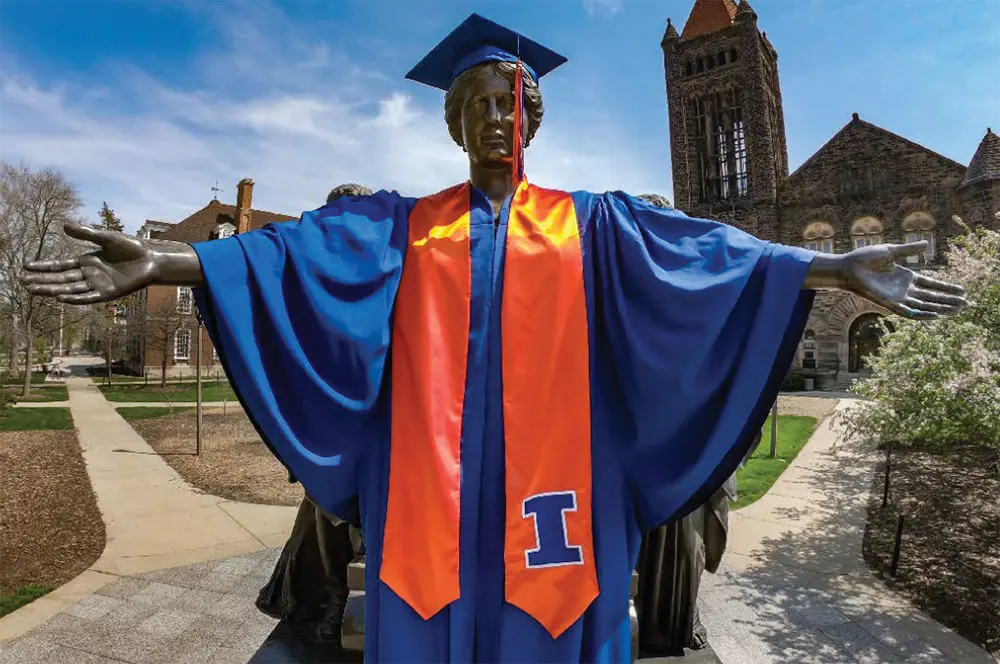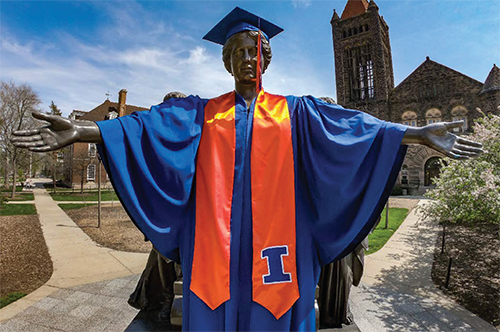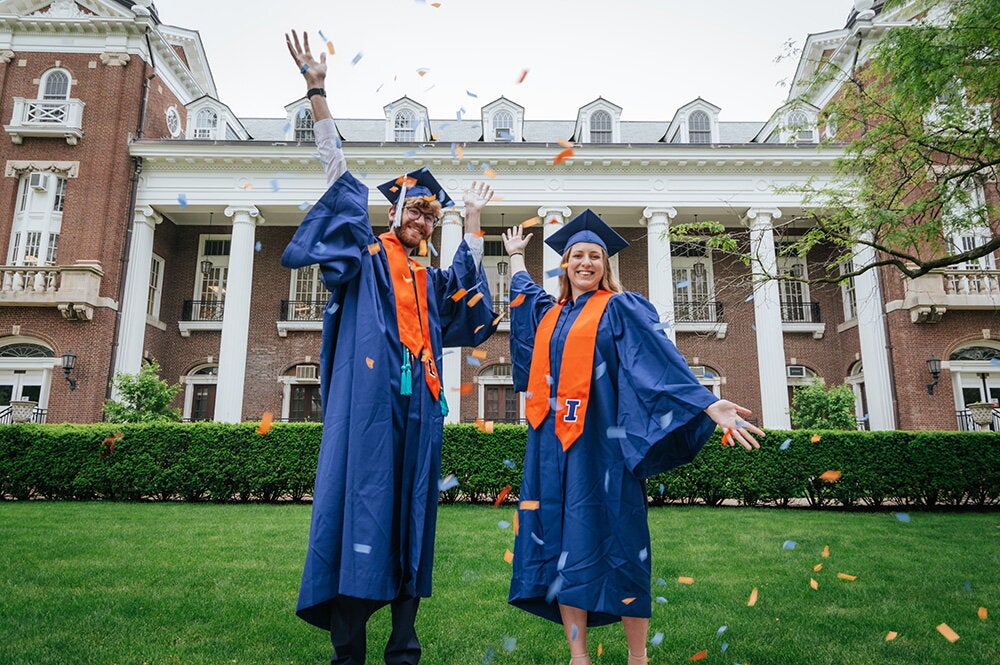

A study of the early career paths of recent University of Illinois graduates reveals that new alumni from the College of LAS are successful in finding jobs and other first destinations.
About 90 percent of new LAS alumni are securing jobs (including military service), continuing education, or volunteer/service positions, according to the Illini Success initiative, a university-wide effort to better understand the early career paths of new alumni.
Meanwhile, starting salaries for those finding jobs has remained consistent, if slightly higher than recent years, at $58,057.
The numbers released in the most recent report reflect LAS undergraduates who graduated during the August 2019, December 2019, and May 2020 graduations. Through the use of direct surveys and other inquiries, the U of I was able to gather data on some 1,619 LAS alumni who graduated in 2019-20—about 47 percent of the total.
Breaking down the 90 percent of LAS alumni who reported a first destination, 41 percent of new LAS alumni were employed within six months of graduation, and 48 percent were pursuing continuing education. Less than one percent were pursuing volunteer and service opportunities.
The average full-time salary for new LAS alumni is third amongst all colleges on campus, behind Gies Business and Grainger Engineering. The average signing bonus of new LAS alumni was $5,000, which is tied for second with three other colleges and behind Grainger Engineering.
Historically, the percentage of graduates securing a first destination within six months of graduation stood at 89 percent in 2018-19; 87 percent in 2017-18; 86 percent in 2016-17; and 83 percent in 2015-16. The average salaries of those who found jobs within six months were $54,949 in 2018-19; $55,325 in 2017-18; $53,226 in 2016-17; and $48,981 in 2015-16. This is the sixth year that campus has conducted the Illini Success survey.
Knowledge rates (the percentage of new alumni that campus was able to gather data for) were lower this year than in previous years, at least partly due to effects of the COVID-19 pandemic. The university identified the post-graduate outcomes of 47 percent of graduates within six months of graduation as compared to 72 percent last year.
“This was an unprecedented year, where our graduates and the university community navigated numerous challenges related to a pandemic that impacted our lives professionally, economically, socially, and personally,” the University of Illinois announced when it released the results. “It is reasonable to expect that these challenges impacted our degree recipients’ post-graduate pursuits and transitions. As such, in 2020—as in all years, every invitation and discussion of the Illini Success survey was accompanied by invitations for our graduates to receive career services throughout their first-year post-graduation.”
Gene Robinson, interim dean of the College of LAS and Swanlund Chair in Entomology, said that the Illini Success survey reveals the strength of a liberal arts and sciences education.
“As apparent through these survey results, our graduates leave the College of LAS with a fantastic array of new skills, abilities, and perspectives that prepare them for many opportunities,” Robinson said. “We are proud to be the starting point for what is undoubtedly a bright and promising future for our alumni.”
Campuswide, some 91 percent of U of I graduates secured a first destination within six months of graduation. About 75 percent of new U of I graduates stayed in the state of Illinois for their first destination (about 68 percent of U of I graduates overall stay in Illinois). The remaining 25 percent found first destinations across 46 other U.S. states and 27 countries.
Some 92 percent of U of I students reported participating in an experiential learning opportunity (internship, research project, study abroad, service learning, clinical programs, etc.), and 35 percent of those experiences resulted directly in a full-time job offer.
“In this year when so many lives and jobs have been disrupted by the pandemic, it is gratifying to see that an Illinois degree provided so many of our recent graduates with a solid foundation for these critical first steps in their future careers,” said Chancellor Robert J. Jones. “Ninety-one percent of our graduates found a first destination in one of the most challenging periods in living memory. And their skills and knowledge are going to play an important role in the recovery and rebuilding that will be necessary in the years to come.”
The Illini Success initiative was spearheaded by The Career Center, but it receives support from units all across campus. The career data has important implications, from addressing the questions and concerns of prospective students to answering accreditors who are measuring institutional quality.
The project is supported by the Office of the Provost, Career Services Council, Division of Management Information, Center for Innovation in Teaching and Learning, Office of the Registrar, Institutional Review Board Office, Council of Undergraduate Deans, undergraduate College administrations, Graduate College, and many more partners across campus.
Other items of note from the LAS numbers include:
- The average starting salary of new alumni grew significantly during the past year for several LAS categories, including mathematics and statistics, which grew from $77,523 in 2018-19 to $79,590 in 2019-20, the highest in the college; literatures, cultures, and linguistics, which grew from $52,675 to $68,857; and English and creative writing, which grew from $44,565 to $52,536.
- Chemical engineering and chemistry alumni had the highest reported rates of first destination (employment, continuing education, and volunteering/service combined) within six months of graduation, at 93 percent.
- English and creative writing alumni had the highest rate of employment in LAS within six months of graduation, at 54 percent. Biological sciences alumni had the highest rates of pursuing continuing education in LAS, at 56 percent (the report does not distinguish between the School of Molecular & Cellular Biology and the School of Integrative Biology).


